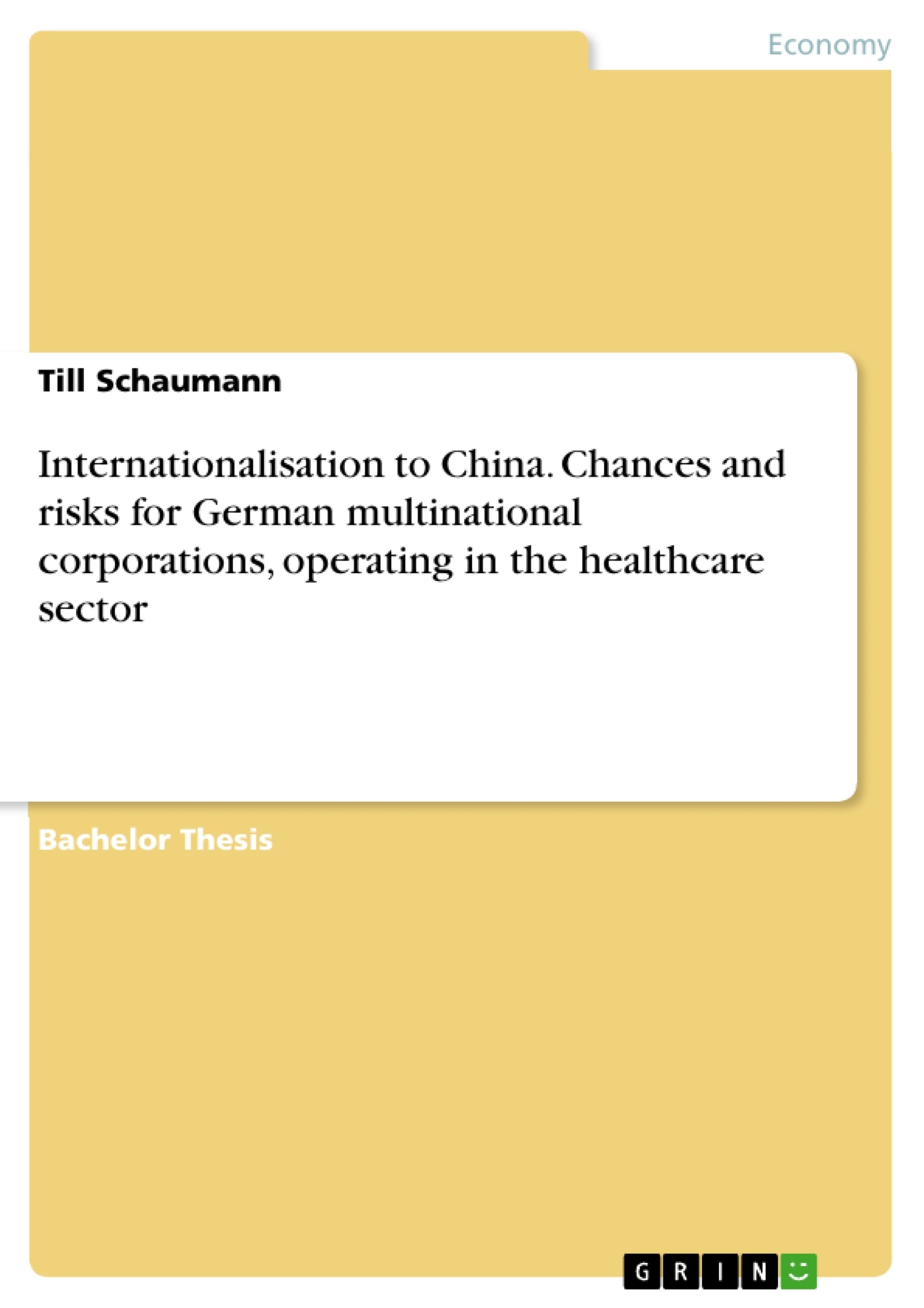“The risk of missing out on China is greater than the risk of doing business in this country” (Heinrich von Pierer, former Siemens CEO and chairman of the supervisory board).
The primary objective of every financial, industrial or commercial business enterprise on the globe is to strive for profit maximisation. To realise this particular goal, corporations have to extend their operations across international borders. After the death of Mao Zedong and since the enforcement of an “open door” policy in 1978, the People’s Republic of China has developed into an attractive investment destination with an enormous economic potential. Since the economic liberalisation of the country, and the transition from a centrally planned economy into a market economy, China has become a popular business partner for national and international business enterprises.
Those companies which decided at an early stage to diversify trade and investments into emerging markets such as China have benefited from generating high sales volumes and impressive profit rates on a long-term scale. The uniqueness of the People’s Republic of China lies in the combination of economic growth, the size of the country, a thirst for knowledge and the maintenance of its political stability. Many western corporations are aware of the strategic opportunities that open up when doing business in China, the Middle Kingdom. However, a large number of national and internationally operating companies from different industrial sectors are facing major challenges, when it comes to making foreign investments in China.
Inhaltsverzeichnis (Table of Contents)
- Introduction
- Research problem
- Course of investigation
- Internationalisation strategies
- Motives for business enterprises when operating abroad
- The process of internationalisation
- Time of market entry
- Market area selection
- Market entry modes
- German multinational corporations in modern China
- German enterprises in the global economy
- The economic development of China
- China country profile
- Historical background
- Economic framework data
- Chances and risks for German companies in China
- German business in China
- Chances
- Risks and challenges
- Industry analysis of the healthcare sector in China
- Global key drivers of the healthcare branch
- Development and modernisation of the Chinese healthcare sector
- Empirical study: German enterprises in the healthcare sector operating in the People's Republic of China
- Design and implementation of the survey
- Objective of the study
- Structure of the questionnaire
- Execution of the survey
- Evaluation and interpretation of the results
- General response to the online survey
- Analysis of first section
- Analysis of second section
- Analysis of third section
Zielsetzung und Themenschwerpunkte (Objectives and Key Themes)
This bachelor thesis aims to investigate the chances and risks for German multinational corporations operating in the healthcare sector in China. It analyzes the motives for internationalization, the process of internationalization including market entry modes, and the economic development of China. The thesis further explores the specific challenges and opportunities for German companies in China, particularly within the healthcare sector. It utilizes an empirical study based on a survey to gather insights from German companies operating in the Chinese healthcare market. This research aims to provide a comprehensive analysis of the current landscape and future perspectives for German businesses in the Chinese healthcare sector.
- Internationalization strategies of German multinational corporations
- Economic development and market opportunities in China
- Challenges and risks associated with doing business in China
- Specific considerations for the healthcare sector in China
- Empirical insights from German companies operating in the Chinese healthcare market
Zusammenfassung der Kapitel (Chapter Summaries)
The introduction chapter defines the research problem and outlines the course of investigation. Chapter 2 examines internationalization strategies, focusing on the motives for operating abroad and the process of internationalization, including market entry modes. Chapter 3 provides an overview of German multinational corporations in modern China, analyzing the economic development of China, the opportunities and risks for German companies, and their involvement in the country. Chapter 4 delves into the industry analysis of the healthcare sector in China, exploring the global key drivers and the development and modernization of the Chinese healthcare sector. Chapter 5 presents an empirical study based on a survey of German companies in the Chinese healthcare sector, examining the design and implementation of the survey and analyzing the results. This section focuses on the companies' motivations, challenges, and opportunities in the Chinese market.
Schlüsselwörter (Keywords)
The main keywords and focus topics of this thesis include internationalization, China, German multinational corporations, healthcare sector, market entry, economic development, risks, chances, empirical study, survey, and business opportunities.
Frequently Asked Questions
What are the main risks for German corporations in China?
While China offers enormous economic potential, German companies face challenges related to political frameworks, market entry barriers, and the transition from a centrally planned to a market economy.
Why is the Chinese healthcare sector particularly attractive?
The attractiveness stems from China's rapid economic growth, the sheer size of the country, and the ongoing modernization and development of its healthcare infrastructure.
What internationalization strategies are discussed?
The thesis explores motives for operating abroad, the selection of market areas, timing of market entry, and various market entry modes.
How does the thesis gather empirical insights?
It utilizes an empirical study based on a survey of German multinational corporations already operating in the Chinese healthcare market.
What did Heinrich von Pierer say about doing business in China?
The former Siemens CEO stated that "the risk of missing out on China is greater than the risk of doing business in this country."
- Quote paper
- Till Schaumann (Author), 2015, Internationalisation to China. Chances and risks for German multinational corporations, operating in the healthcare sector, Munich, GRIN Verlag, https://www.grin.com/document/296247



